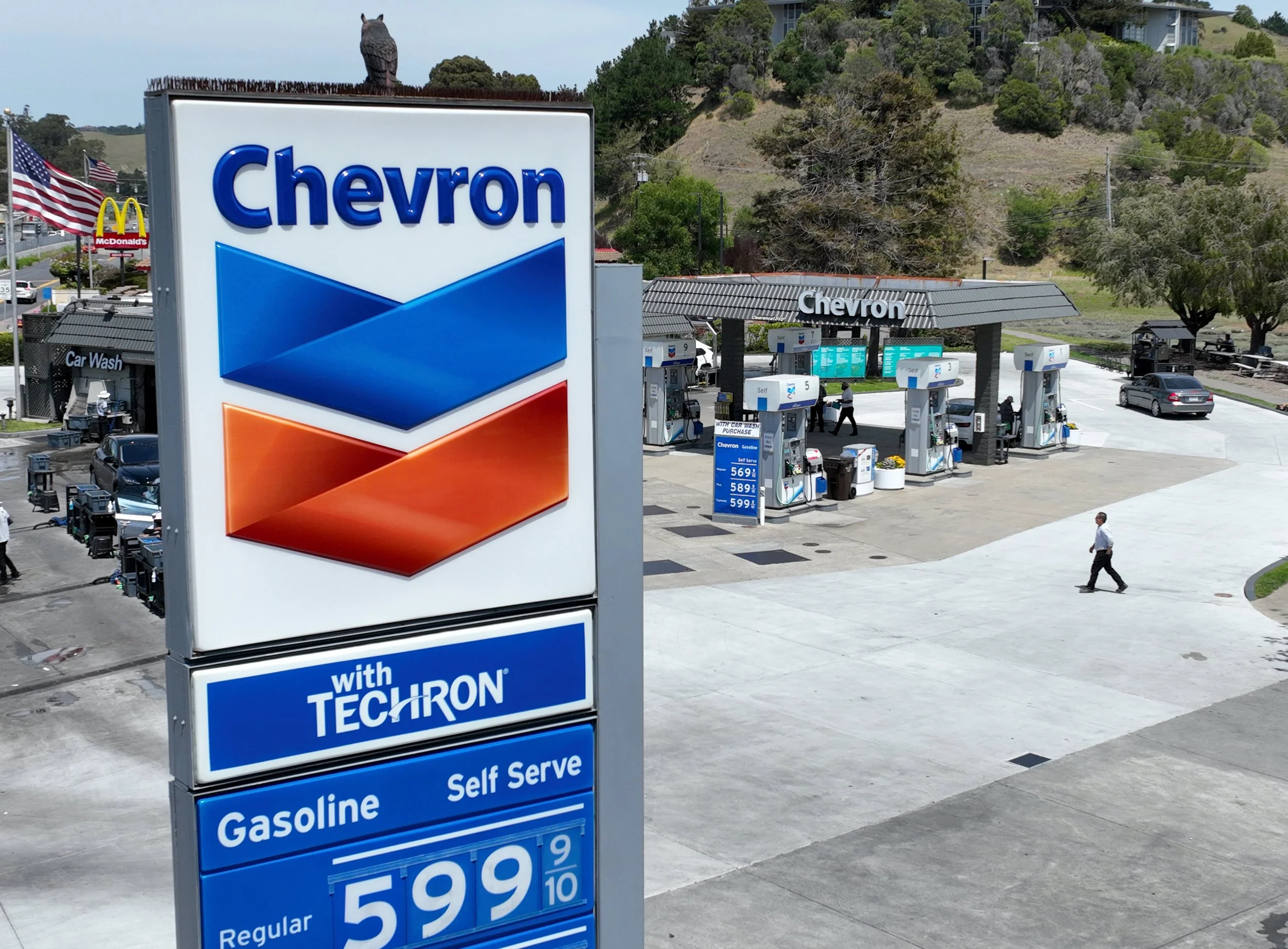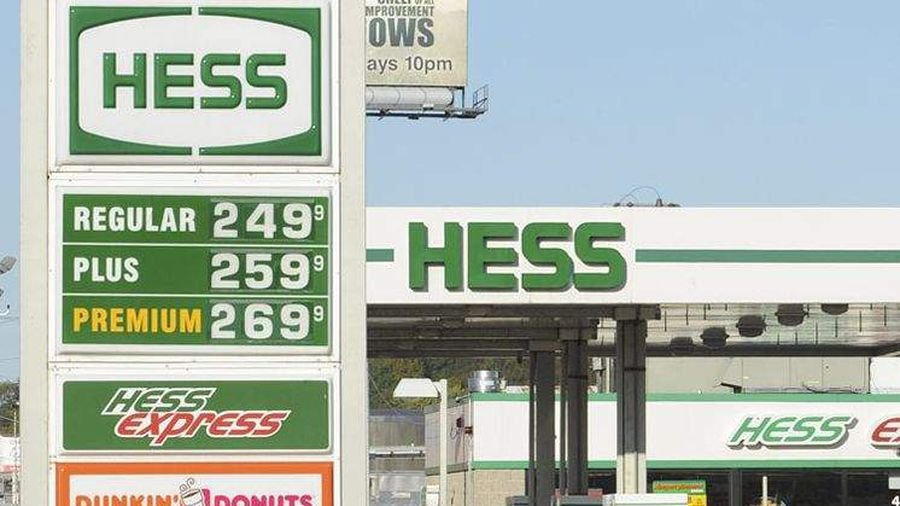Chevron’s mega-deal
What happened?
Chevron has agreed to buy Hess for $53 billion, in an all - stock transaction. It comes just two weeks after Exxon Mobil bought Pioneer Natural Resources for $59.5 billion.
The deal values Hess at $171 a share, with Hess shareholders receiving 1.0250 shares of Chevron.
Shares of Chevron dropped 3% in premarket trading following the announcement, while Hess’ shares were slightly higher
Chevron: A quick glance
What? An oil and gas company
Industry: Petroleum refineries
Founded: 1879, California, US
Current CEO: Mike Wirth
Market size: $275.36 billion
Number of countries active in: 180
Image courtesy of CNBC
What do the companies actually do?
For Chevron:
They “produce oil, natural gas and many other essential products”. Their products are sold in more than 8,000 Chevron and Texaco retail stations across the US. They also supply aviation fuel across the US too.
Quick facts:
· They are a leading developer, marketer and manufacturer of lubricant and fuel oil additives.
· In 2020, Chevron was one of the top producers of net oil- equivalent in California, US.
· Chevron was one of the largest liquids producers in 2020.
For Hess:
They are a, “leader in deepwater development and production, with top quartile performance in offshore drilling and project delivery.”
Quick facts:
· Hess has been named E&P Explorer of the Year, in a 15th annual Wood Mackenzie exploration industry survey announced in June 2023.
Image courtesy of ESGNews
Why has Chevron decided to buy Hess now?
As previously stated, oil consolidation seems to be occurring more and more, take Exxon Mobil’s acquisition a few weeks ago. But why? Why are cash - rich oil companies deciding to buy their competitors now? Let’s explore some reasons.
· Higher energy prices. Since the Covid-19 pandemic in 2020, we’ve been seeing an increased demand for oil, and an increased price for it too. War in Ukraine and Israel, as well as geopolitical tensions between the US and China have resulted in Crude oil prices rising rapidly (Crude oil prices have almost gone past the $100 per barrel mark in 2023 alone). Add in the fact that oil markets and OPEC+ have cutback oil production, and you have prices sitting at prices not seen in a few years. Higher prices come as a result of such companies wanting to leverage off of this demand, a desire to increase sales and profitability, and come as a need for supply to keep up with demand.
· It’s a strategic move. Chevron and Hess have had talks about the possibility of an acquisition in the past. To Chevron CEO, the prices make more sense now than it did a few years ago. The stocks of the two companies have traded into a way in which an acquisition works. Their cultures and the overall vision of the two seem to align well too. What companies like to see, is growth. Financial projections in the future seem to be in favour for the oil and has industry, and specifically for the companies. According to John Hess, Hess’ CEO he believes that selling the company to Chevron is in the best interests of the company, now and in the future.
What does the deal mean for Chevron?
· Think growth- in production, cash flow and resources. The acquisition adds a major oil field in Guyana as well as shale properties in the Bakken Formation in North Dakota, US. Guyana is a South American state set to become the world’s fourth-largest oil producer. This places the country ahead of the US, Qatar, Norway and Mexico. It has also become a major producer in recent years, with companies like China’s CNOOC and Exxon Mobil desiring lucrative oil fields in northern South America. In terms of cash flow, the deal is expected to extend Chevron’s growth profile in the next 10 years. Hess’ purpose is to be the, “world’s most trusted energy partner.” They’ve taken the next step to turn this into a possibility.
Image courtesy of Hess.com
· It makes Chevron a stronger player. Even though Exxon Mobil’s recent acquisition stood at a higher price than Chevron’s, it means that they’re a stronger force to be reckoned with. Chevron’s diverse portfolio, their financial strength and their high cash returns, couple with Hess’ growth strengths, their success in Guyana and their overall expertise means that competitors will be keeping a very close eye on the aftermath of the deal. The competition is heating up.
What does the deal mean for the oil and gas industry?
· Is consolidation key? We’ve witnessed two massive oil companies acquire other valuable companies within the industry. In 2019, Chevron bought Anadarko Petroleum for $33 billion. Anadarko Petroleum focused on the production and exploration of natural gas and crude oil. The deal helped it to grow Chevron’s shale production and natural gas operations. In this industry, it looks like the saying rings true, “If you want to go fast, go alone; if you want to go far, go together.” After all, why compete when you can collaborate? Why try and build something yourself, with you can partner with others, and build an even better company?
Image courtesy of Vidyatec
· There is still confidence in the sector. Many companies are moving away from fossil fuels and are switching to greener alternatives. With an increase in the adoption of electric vehicles, governments introducing policies and altering laws, and other initiatives which are being rolled out, it can be argued that the move is fast, but it’s not fast enough. Many economists and thought leaders have expressed ideas that the industry will become less and less important as the years go by. According to the IEA chief, the demand for oil, gas and coal will peak by 2030. The recent acquisitions spark the idea that companies within the sector are still in demand (at least for now), and that the sector could be relatively well in the near future.
What happens during an acquisition?
An acquisition is when one company, buys another company. Companies do this because they see something valuable in the other company, such as its services and products. The purchaser can pay by money or shares in its own stocks, in exchange for the other company’s shares or ownership. Once the acquisition has been complete, the company becomes one big company.
An acquisition can provide new avenues of growth, allows new ideas to thrive and lead to a better business overall.
During an acquisition:
· Various negotiations take place. This includes negotiating the terms of the deal, including the price and prices of the shares, and how the acquisition will work.
· Extensive due diligence is conducted. The buying company looks into the financial health of the company they are interested in buying, such as their assets, liabilities, any legal cases and more. Contracts are drafted and signed as well. Lawyers who specialise in Mergers and Acquisitions play a crucial role.
· Regulatory approvals. In some cases, acquisitions need the green light from regulatory bodies within the industry. This is to ensure that no anti-competitive practices are being done and ensures that harm within it doesn’t occur.
· Shareholder approvals. The shareholders of both companies may need to vote on the deal. This is more common in cases where new stocks will be issued or a change in ownership and/or corporate structure.
Note: These are the common steps that happen during an acquisition. More steps may be eeded, but this depends on the complexity and size of the deal.
Has the deal actually come at the right time?
Although shareholders may be in good spirits right now, there are a number of people and groups who aren’t happy with the deal. With climate change fears, a summer of high temperatures around the world, higher energy prices amid high inflation and interest rate figures, calls for windfall taxes, calls for such companies to switch to and adopt more renewable and more environmentally-friendly practices, it’s no wonder that many are questioning the timing of this deal.
Should the acquisition have happened already? Should the deal have waited? Should the dela have happened at all?
The questions are valid and ones that many are taking into consideration.
My final thoughts:
In terms of building a better business and business operations, I think this deal will be a good one for Chevron. When you pair two strong companies together, you get a more efficient company. I am thinking about the long term future of the deal though, my main concerns come about the sustainability of the oil and gas industry itself.
Companies are becoming more and more greener in their practices and people demand and even expect more accountability and transparency when making the switch. Not only are social attitudes towards oil and gas companies becoming more and more bitter, but I believe these opinions, laws, regulations and more, will impact the industry in a negative way. In 50 years’ time, the oil and gas industry may be no more. The energy sector would have changed drastically, and I think it will only be a matter of time until greener alternatives run the industry.
But for now, for the near future (in the next decade), the industry looks to be relatively stable and even do well – recent acquisitions are an example of this being the case.
What are your thoughts on the story? Do you think the deal will be a success? Comment below, message or send me an email, I’d love to know your views!
That’s it for this week!
Until next time, remember to stay curious!
DISCLAIMER:
This blog is for informational purposes only. Parah Insights is not associated with the news sources in this blog, and sharing does not equal endorsement. Parah Insights does not provide financial, tax, legal or accounting advice – always consult your financial and legal advisors to determine what’s right for you and your business.
Further resources:
‘Chevron agrees to buy Hess for $53 billion’ – Article by CNN Business
‘Chevron buys Hess for $53 billion, 2nd megadeal in the oil patch this month as energy prices soar – Article by APNews
‘Chevron and Hess CEOs on Why Their Merger Is a ‘Win-Win’’ – YouTube video by Bloomberg Television
‘Hess CEO John Hess on Chevron deal: Strategic combination creates the premier oil and gas company’ – YouTube video by CNBC Television




